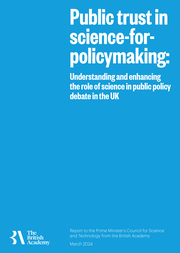Public trust in science-for-policymaking

- Year
- 2024
- Publisher
- The British Academy
- Number of pages
- 45
Summary
In early 2022, the Prime Minister’s Council for Science and Technology, the main science advisory body to the Prime Minister, commissioned an independent review from the British Academy of science and public trust within the policymaking system. This report summarises the findings of the review.
Science increasingly plays a central role in public debates on policy, as starkly exposed during the COVID-19 pandemic. The pandemic highlighted significant challenges around the use and communication of science in policymaking, as well as varying levels of public trust in the rigour and relevance of scientific findings. While the case of COVID-19 may represent an outlier in terms of its public salience, it does raise key questions about trust in the science informing policymaking – making it vital to understand the factors influencing public interest and trust in science-for-policy.
Clearly, scientific knowledge – understood in the broad sense to capture new knowledge produced across all disciplines – is one of many forms of knowledge and information that need to inform policymaking and debate. But such knowledge is crucial in guiding decisions, especially in areas of complexity and risk. Public interest and trust in science-for-policy is therefore vital for the health of public policy debate. Where science is a key factor in policymaking, the evidence it generates can help foster better deliberation on policy. And where publics recognise the value of such science in policymaking, they will expect science to play a more central role, making the rigorous use of science key to the accountability of public policy.
The report summarises three key insights:
- Policymakers (both politicians and officials) play a central role in framing policy and the place of science in informing it.
- In exercising this role, they should not underestimate the public's desire for nuance and transparency in the use of science-for-policy. Policymakers should be open where there are uncertainties, while indicating how knowledge gaps will be addressed; recognise that more information will not in itself increase trust in the use of science for policy; and avoid a simple 'follow the science' approach, instead acknowledging the diversity of considerations and evidence, including lived experience, shaping policy development.
- Policymakers, researchers and knowledge brokers should deepen their engagement with different publics to build trust in science. This should be done in a way that preserves the integrity and independence of the scientific process. Clearer principles should be developed to ensure transparency and accountability in both science-policy and science-public engagement.
Beyond these headlines, the report identified four sets of factors that influence public perspectives of the relevance and trustworthiness of science-for-policy: features of the policy area and how it is framed; the types of scientific sources invoked in policy debate; how science-for-policymaking is communicated and brokered; and underlying attitudes amongst different members of the public.
The report concluded with 10 broad considerations as a basis for making changes in practice to the mechanisms and tools policymakers, researchers and science brokers use to strengthen public interest and trust in science-for-policymaking. These are broken down by the target audience (expanded on further in the report):
- For public officials and policy advisors:
- seek to invoke science early on in the framing process
- avoid an approach that simply ‘follows the science’
- promote transparency in how evidence is used
- acknowledge uncertainty and ambiguity
- protect and sustain scientific integrity and independence
- For researchers and knowledge brokers:
- ensure sensitivity to different perspectives in communicating findings
- play an active role in helping frame policy issues early on in the debate
- For all engaged in the science-for-policymaking system:
- avoid the ‘information deficit model’: simply providing more evidence is unlikely to shift people’s views
- recognise and respect the role of local perspectives and knowledge
- avoid contributing to polarisation